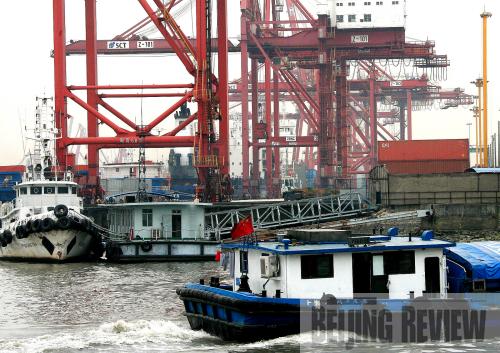|
 |
|
CHEN FEI FAINT RESURGENCE: Shanghai's imports and exports have declined for three consecutive months this year. The drop in March was less than it was in the first two months |
The economic data in the first quarter entail worries about the future, including a fiscal revenue decline, lending surge and sluggish overseas demand.
The positive changes in the first-quarter economic performance have meant that the national economy has gotten off to a good start this year, and provided a basis for the national economy to maintain a steady and fast growth, said Yao Jingyuan, chief economist at the National Bureau of Statistics (NBS). But difficulties and contradictions still exist, which would undermine the basis.
Lending surge
The NBS said that China's financial institutions fulfilled 90 percent of the annual lending target set by the government in the first quarter of this year. But there are concerns that the lending surge may lead to a new round of price increases or inflation, or even stagflation. Moreover, the amount of loans available in the next three quarters will inevitably diminish, which can lead to a slower pace of economic growth.
China saw a sharp increase in the amount of new loans issued and the money supply, especially the broad money supply, so that it is natural for people to worry about upward pressure on prices, said NBS spokesman Li Xiaochao.
Li stressed that the macroeconomic situation would decide whether the concern about price increases caused by the money supply and new loans would become reality or not. Overall social demand has not caused an imbalance between aggregate supply and demand, and that international price levels are still low.
However, when the real economic development cannot keep pace with the money supply, price hikes will occur, Li said.
Fiscal imbalance
In the first quarter, China's fiscal revenue decreased by 8.3 percent year on year, while its fiscal expenditure increased 34.8 percent year on year. Generally, China will suffer an acute imbalance between fiscal revenue and expenditure in 2009, Yao said. The fiscal revenue plummet was the result of an economic growth slowdown but also attests to the government's efforts to take less profit and cut taxes, he said.
According to the 2009 fiscal budget issued by the Central Government, the government will increase its spending on improving people's livelihoods, despite the sluggish economy. For example, the Central Government increased its allocations for agriculture, farmers and the countryside by 20.2 percent year on year and for social security by 29.4 percent.
"By now, the world financial crisis has not bottomed out," Yao said. "The Chinese Government strives to minimize the impact by expanding fiscal expenditure, which will put pressure on China's fiscal balance."
Sluggish overseas demand
Foreign trade has constituted another potential malaise for China's economy. China's imports and exports continued slipping in March. Although it dropped in a slower pace compared with the previous two months, it doesn't mean an upturn.
China's economy is largely dependent on overseas markets, especially its more economically developed provinces. The global economic crisis has not yet hit bottom, and it is hard to say whether overseas demand has already taken a turn for the better. Amid uncertain overseas demand, China will struggle to find a way out of the predicament during the first half of the year, said Bao Yongjiang, Director of the China Suburban Economy Research Association, a government-approved research institute based in Beijing.
It will be difficult for China's foreign trade to improve because the global economy led by the United States has not yet recovered, and the negative growth for China's foreign trade will continue, said Zhu Baoliang, Chief Economist of the Economy Forecast Department of the State Information Center.
Yao pointed out that the country's export-oriented economy has not lost its competitiveness, because export decrease was mainly caused by declining overseas demand. Yao also stressed the importance of improving the level of economic growth mode amid the crisis. "It is time for us to strengthen ourselves," he said. | 